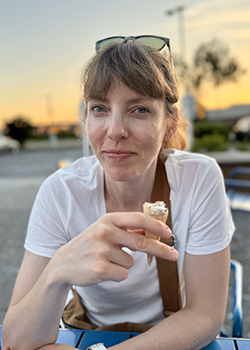No-screen policy: Dr. Helen Veit fosters student success through community, belonging
By Richard Taylor
 Dr. Helen Veit, associate professor of history at Michigan State University, specializing in American food and culture, has a unique approach on how to create learning environments where students truly thrive.
Dr. Helen Veit, associate professor of history at Michigan State University, specializing in American food and culture, has a unique approach on how to create learning environments where students truly thrive.
Starting in 2023, she introduced a no-screen policy requiring students to set aside their devices the moment they step into her classroom, even before the class session has started. “There were virtually no laptops when I was a college student,” Dr. Veit explained, “and even when I was a young graduate student teaching my first classes, I could always hear the buzz of the class when I walked down the hall, with students talking and laughing. In recent years, you rarely hear that anymore. In many classrooms today, students sit on their phones in silence waiting for class to begin. At the same time, many college students report feeling lonely.”
Empowering academic success
Dr. Veit’s teaching philosophy highlights the value of interdisciplinary learning and the need to reimagine classroom environments. “I became increasingly frustrated by how distracting laptops were,” she explained. “I was also really compelled by research suggesting that taking notes on a laptop, even though you can record more content, is not actually better for student learning and comprehension.”
By creating a no-screen policy in her classroom, Dr. Veit encourages students to engage deeply with the material and with each other. This approach fosters critical thinking and intellectual curiosity, two foundational pillars of academic success. Removing distractions also allows students to build lifelong learning skills, helping them navigate their academic and professional journeys with greater focus and confidence.
Creating space for community and wellbeing
“Creating a community where students feel they belong is essential,” Dr. Veit shared. To do so, she makes her classroom a space where diverse perspectives are welcomed and valued while actively encouraging students to interact with each other before class. Through simple prompts, Dr. Veit uses the pre-class time to build a sense of community and engagement among students. “I encourage students to talk with each other before class starts. Sometimes I put a prompt on the screen, something as basic as suggesting students ask the person next to them what they did this weekend or whether they have siblings,” she said. “The results have been remarkable, with students chatting before and after class, creating connections, and fostering a collaborative atmosphere.”
But Dr. Veit recognizes that the challenges students face today extend beyond academics, encompassing mental health and social interaction. “Communication really is a skill,” she noted. “One thing that the ubiquity of phones has made clear is that students aren’t always sure what to do socially, even when they want to be socializing more. Many of them now enter college without a lot of practice connecting with strangers or starting new friendships.” In turn, Dr. Veit’s classroom approaches create a supportive environment that promotes wellbeing and provides opportunities for growth in skills not traditionally taught in the classroom, as well as giving students chances to connect with classmates.
While Dr. Veit sometimes has to remind students about the no-screen policy, it happens infrequently. “I do have language in my syllabus about the screen policy. If you’re consistently breaking it, I reserve the right to ask you to leave. But that’s never happened,” she explained.
This thoughtful approach has inspired students to stay connected beyond the classroom. On the last day of one class this past fall, students lingered for nearly an hour, chatting with her and with each other, something increasingly rare in today’s digital age. When thinking back to that first day of class without screens, “some of the students admitted they felt really awkward at first,” she noted, but the policy quickly became a success. “Many students have told me that they’ve made more friends in my classes than they ever have.” That alone can change the tenor of a student’s experience at MSU.
Dr. Veit’s classroom approach and student-centered teaching are simple and effective methods for creating community and a sense of belonging for students. Spaces and places where students can continue to develop into the leaders and innovators of tomorrow are essential to MSU’s mission and enabling all the students we admit to learn, thrive and graduate.